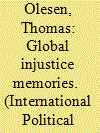| Srl | Item |
| 1 |
ID:
114088


|
|
|
|
|
| Publication |
2012.
|
| Summary/Abstract |
The success of norms constructivists rests in part on their assertion of academic activism as a heroic aspect of intellectual life. Critics of this vision, however, insist on the complicity of norm scholars in creating and maintaining processes of global injustice. Frustrated with this criticism, Richard Price calls for answers to a simple question: can detractors go beyond mere criticism and provide a praiseworthy target toward which norms constructivists can aim? We respond to this challenge, first, by offering an internal critique of Price's logic. We suggest that Price and other norms entrepreneurs underplay the darker, colonial side of modern ethical life on which the successes of norms cascades depend. Second, we draw on Adam Hochschild's King Leopold's Ghost to contrast contemporary norms constructivists with the heroic characters represented in and by this book. Norms entrepreneurs, Edmund Morel and Roger Casement, successfully exposed Belgian atrocities in colonial Congo, and Hochschild himself brings this mostly forgotten history to light. Yet the narrative trajectory of these three heroes is tragic, compelling each to face their complicity in the very forces they resist. This tragic vision calls us not to celebrate but to resist the continuing legacies of colonial domination.
|
|
|
|
|
|
|
|
|
|
|
|
|
|
|
|
| 2 |
ID:
130911


|
|
|
|
|
| Publication |
2012.
|
| Summary/Abstract |
Within a relatively short span of time, and culminating with the tenth anniversary of the genocide in 2004, the 1994 Rwanda genocide has become a key global injustice memory. At the core of this process is a double-sided conception of injustice: on the one hand, the genocide in itself clearly constitutes a major injustice; on the other hand, injustice claims have been expanded to encompass actors outside of Rwanda who observed the horrors without instigating sufficient action to halt, or at least mitigate the effects of, the unfolding genocide. It is the fact that moral and political responsibility for the genocide has been so powerfully expanded to third parties in a spectatorship position that most vividly testifies to the global character of the Rwanda injustice memory. The article identifies and analyzes four areas in which the transformation of the Rwanda genocide from national event to global injustice memory has occurred: institutionalization, expressions of regret, analogical bridging, and cultural products. The article argues that the transformation of non-Western events into global injustice memories has so far been insufficiently explored within International Relations and global political sociology.
|
|
|
|
|
|
|
|
|
|
|
|
|
|
|
|